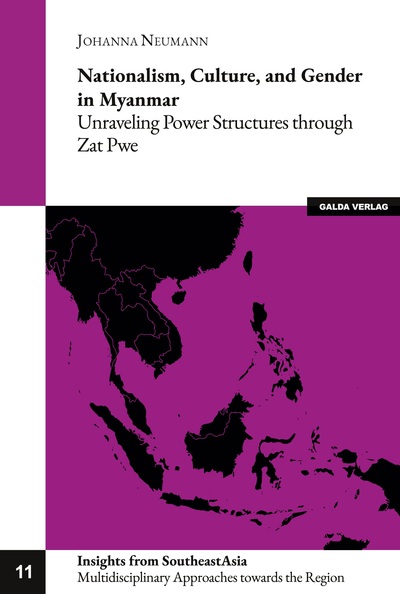Nous utilisons des cookies pour améliorer votre expérience. Pour nous conformer à la nouvelle directive sur la vie privée, nous devons demander votre consentement à l’utilisation de ces cookies. En savoir plus.
Nationalism, Culture, and Gender in Myanmar
EAN : 9783962033880
Édition papier
EAN : 9783962033880
Paru le : 25 nov. 2024
68,00 €
64,45 €
Disponible
Pour connaître votre prix et commander, identifiez-vous
Notre engagement qualité
-
 Livraison gratuite
Livraison gratuite
en France sans minimum
de commande -
 Manquants maintenus
Manquants maintenus
en commande
automatiquement -
 Un interlocuteur
Un interlocuteur
unique pour toutes
vos commandes -
 Toutes les licences
Toutes les licences
numériques du marché
au tarif éditeur -
 Assistance téléphonique
Assistance téléphonique
personalisée sur le
numérique -
 Service client
Service client
Du Lundi au vendredi
de 9h à 18h
- EAN13 : 9783962033880
- Réf. éditeur : 373697
- Date Parution : 25 nov. 2024
- Disponibilite : Disponible
- Barème de remise : NS
- Nombre de pages : 276
- Format : H:230 mm L:155 mm E:17 mm
- Poids : 463gr
- Résumé : This book employs zat pwe —a popular performance art event—to examine how nationalist concepts of culture and gender shape and sustain power relations in Myanmar society. The focus is on the performance events, including the ten-hour nightly shows, the professional troupes that stage them, the Bama-speaking village and ward communities that organise and attend them, and the absent intellectuals who discuss them. Drawing on ethnographic fieldwork with several traveling zat troupes based in Mandalay, but performing across various states and regions, as well as with residents of different wards in Mandalay, the study uncovers a nationalist discourse that reaches beyond political arenas and into the everyday life of Bama society. This discourse is transmitted through concepts of culture and gender that influence the power dynamics between the educated elite and ordinary citizens, as well as between men and women. The research illustrates how these concepts, embedded in nationalist discourse, intersect with one another and with ideas from other discourses, reinforcing hierarchical relations. By focusing on zat pwe events, this book sheds light on a significant yet frequently overlooked aspect of Bama society, precisely due to the very power structures under examination. ABOUT THE SERIES Developments in the field of area studies - goaded by the analytical deconstruction of world regions as such - have deeply affected the knowledge production on societies and cultures located in these politicized compartmentalization of the globe. With this series, the editors and authors wish to contribute to a reformulation of area studies that emphasizes the continuing epistemic value of contextualized knowledge production that is firmly rooted in concrete places. Starting with the notion of Southeast Asia, books published in this series will contribute to a more nuanced understanding of regionality based on a multidisciplinary approach. The series represents an oulet for young scholars intending to publish their degree theses and dissertations; and for established scholars who are looking for a place to republish out-of-print books, edited volumes or themed collections of their own papers and articles. We also invite scholarly collectives to publish collaborative works or edited volumes on topics that usually will not attract the attention of big presses due to their transdisciplinary orientation or the niche character of their topic. Our overall motivation is to maintain Southeast Asian studies as a critical and self-reflexive academic field. EDITORIAL BOARD Dr. Benjamin Baumann, Chief Editor PD Dr. Daniel Bultmann Prof. Caroline S. Hau Prof. Vincent Houben Prof. Peter A. Jackson Prof. Guido Sprenger Prof. Barend Jan Terwiel Dr. Xue Li
- Biographie : Johanna Neumann is a language lecturer for Burmese at Humboldt University Berlin. She holds a B.A. in Area Studies from the same university and an M.A. in Southeast Asian Studies from SOAS, London. This book is based on her doctoral dissertation.

